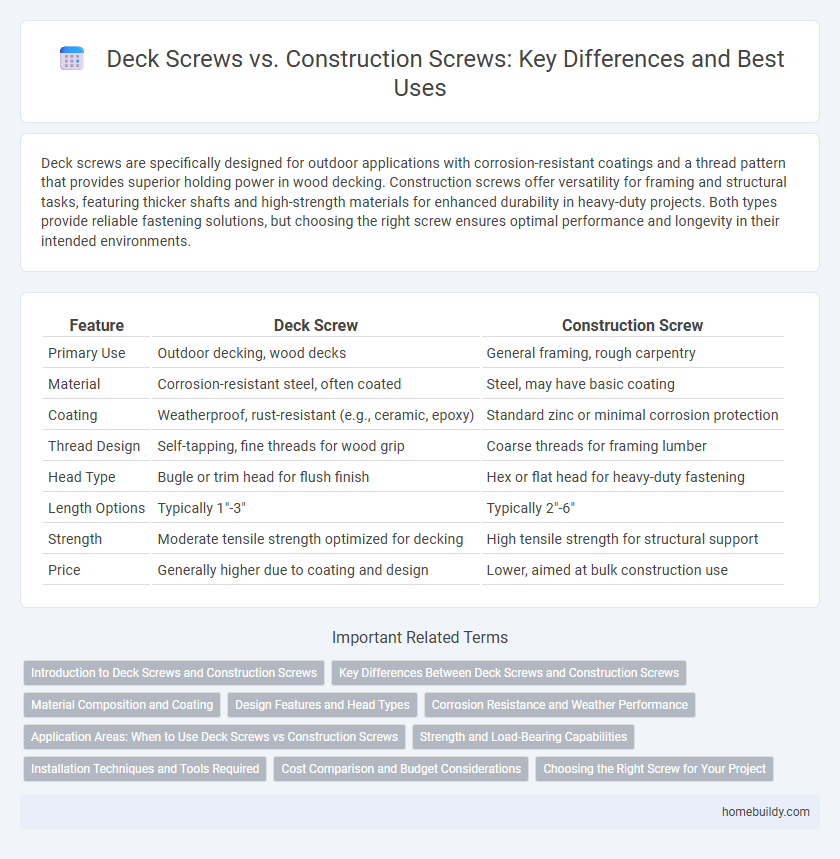Deck screws are specifically designed for outdoor applications with corrosion-resistant coatings and a thread pattern that provides superior holding power in wood decking. Construction screws offer versatility for framing and structural tasks, featuring thicker shafts and high-strength materials for enhanced durability in heavy-duty projects. Both types provide reliable fastening solutions, but choosing the right screw ensures optimal performance and longevity in their intended environments.
Table of Comparison
| Feature | Deck Screw | Construction Screw |
|---|---|---|
| Primary Use | Outdoor decking, wood decks | General framing, rough carpentry |
| Material | Corrosion-resistant steel, often coated | Steel, may have basic coating |
| Coating | Weatherproof, rust-resistant (e.g., ceramic, epoxy) | Standard zinc or minimal corrosion protection |
| Thread Design | Self-tapping, fine threads for wood grip | Coarse threads for framing lumber |
| Head Type | Bugle or trim head for flush finish | Hex or flat head for heavy-duty fastening |
| Length Options | Typically 1"-3" | Typically 2"-6" |
| Strength | Moderate tensile strength optimized for decking | High tensile strength for structural support |
| Price | Generally higher due to coating and design | Lower, aimed at bulk construction use |
Introduction to Deck Screws and Construction Screws
Deck screws feature corrosion-resistant coatings and sharp threads designed to securely fasten wood decking boards, offering enhanced holding power and durability in outdoor environments. Construction screws are engineered for structural applications, providing higher tensile strength and compatibility with various materials like wood, metal, and composite, ensuring robust load-bearing connections. Both screw types have specialized head designs and drive styles, optimizing installation efficiency and material performance in their respective uses.
Key Differences Between Deck Screws and Construction Screws
Deck screws are specifically designed with corrosion-resistant coatings and sharp threads ideal for outdoor wood decking, offering superior holding power in treated lumber. Construction screws, while versatile for various building projects, typically feature a thicker gauge and less specialized coating, prioritizing strength over weather resistance. Key differences include material composition, thread design, and intended application, making deck screws optimal for exterior use and construction screws better suited for structural framing.
Material Composition and Coating
Deck screws typically feature a corrosion-resistant coating such as epoxy or ceramic and are often made from hardened steel or stainless steel to withstand outdoor weather conditions. Construction screws are generally composed of carbon steel or alloy steel with a zinc or phosphate coating to enhance durability and resist rust during indoor or framing applications. The specific material composition and coating directly impact the screws' suitability for exposure to moisture, UV rays, and varying temperatures.
Design Features and Head Types
Deck screws feature corrosion-resistant coatings and deep threads designed for wood decking, ensuring strong grip and durability in outdoor conditions. Construction screws typically have a thicker core and aggressive threads for enhanced holding power in framing and structural applications. Head types vary, with deck screws commonly using bugle or Phillips heads for flush finishes, while construction screws often feature hex or Torx heads for increased torque and driving precision.
Corrosion Resistance and Weather Performance
Deck screws, typically coated with ceramic or epoxy finishes, offer superior corrosion resistance and weather performance ideal for outdoor use in deck construction. Construction screws generally have a zinc or plain steel coating, which provides less protection against moisture and rust compared to deck screws, making them less suitable for prolonged exposure to harsh weather conditions. For projects where long-term durability against corrosion and weather is critical, deck screws provide a more reliable fastening solution.
Application Areas: When to Use Deck Screws vs Construction Screws
Deck screws are specifically designed for outdoor applications like wood decks, fences, and patios due to their corrosion-resistant coatings and sharp threads that provide strong holding power in softer wood materials. Construction screws are more versatile, commonly used for framing, subflooring, and structural applications where higher load-bearing capacity and durability are essential, often featuring thicker shafts and stronger materials. Choosing deck screws ensures better weather resistance and reduced splitting in exterior wood projects, while construction screws excel in heavy-duty tasks requiring enhanced structural integrity.
Strength and Load-Bearing Capabilities
Deck screws feature corrosion-resistant coatings and hardened steel construction designed for outdoor use, offering high tensile strength and excellent shear resistance for deck boards. Construction screws provide superior load-bearing capacity with thicker shafts and deeper threads engineered to handle heavy framing loads and structural stress. Comparing strength metrics, construction screws typically exceed deck screws in shear strength and withdrawal resistance, making them ideal for critical framing applications requiring maximum durability.
Installation Techniques and Tools Required
Deck screws typically require a drill with a Phillips or square drive bit for quick, secure installation into wood decking, ensuring corrosion resistance and a clean finish. Construction screws often need a more powerful impact driver or drill with compatible bits to handle tougher materials like framing lumber or metal, providing greater torque and durability during installation. Choosing the correct screwdriver bit and maintaining steady torque control are essential for preventing screw stripping and optimizing fastening strength in both applications.
Cost Comparison and Budget Considerations
Deck screws typically cost less per unit than construction screws due to their specialized corrosion-resistant coatings and thread designs, making them a budget-friendly choice for outdoor projects. Construction screws, often designed for heavier load-bearing applications and structural integrity, come at a higher price point reflecting their enhanced durability and strength. When evaluating costs, consider the project's exposure conditions and required screw performance to allocate budget efficiently and avoid potential rework expenses.
Choosing the Right Screw for Your Project
Deck screws feature corrosion-resistant coatings and coarse threads ideal for outdoor wood decking, ensuring strong grip and durability in moist environments. Construction screws offer higher shear strength and a variety of head types suitable for framing, subflooring, and heavy-duty structural applications. Selecting the right screw depends on project requirements like exposure to weather, load-bearing needs, and wood type to maximize performance and longevity.
Deck Screw vs Construction Screw Infographic

 homebuildy.com
homebuildy.com